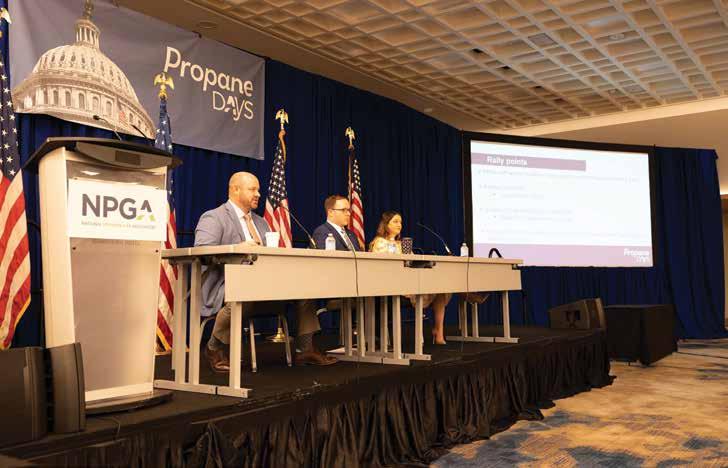
8 minute read
Propane Advocacy in Action:
TPGA Makes Voice Heard on Capitol Hill
Last month marked a significant milestone for the Texas Propane Gas Association (TPGA) as a Texas delegation met in Washington D.C. to participate in Propane Days on Capitol. This annual advocacy event, organized by the National Propane Gas Association (NPGA), was particularly momentous for TPGA, as it marked their first attendance in several years. The grassroots event served as a platform for NPGA members from 40 different states (including Texas) to engage with over 200 Congressional offices. The magnitude of the occasion was evident as more than 465 individuals, including 15 members of Congress and over 250 Congressional staffers, gathered at NPGA’s BBQ reception held in the Rayburn Cafeteria. This turnout reflected the growing support and recognition for the propane industry’s advocacy efforts.
Advertisement
Propane Days kicked off with a legislative briefing from NPGA’s legislative team, which educated members from across the nation on the most pertinent issues facing the propane industry by the federal government. NPGA coached and armed participants with important information on propane’s impact on each state and issue briefs for the offices.
The TPGA delegates from Texas met with both U.S. Senator John Cornyn’s office and U.S. Senator Ted Cruz, who is a ranking member of the Senate Committee on Commerce, Science & Transportation. That committee oversees issues including highways, rail, shipping, transportation security, weather, disasters, interstate commerce, consumer issues, economic development, competitiveness, product safety, and insurance. The Texas delegation also met with: staff from Congressman Jodey Arrington (R-Lubbock)’s office, who chairs the House Budget Committee and is on the House Ways and Means Committee; Congressman Randy Weber (R-Gulf Coast), who serves on the House Committee on Energy and Commerce, where he serves on the Energy, Climate, and Grid Security, Communications and Technology, Environment, Manufacturing, and Critical Materials subcommittees; Congressman Tony Gonzales (R-San Antonio/Uvalde), who serves on the House Homeland Security Committee; and Congressman Lloyd Doggett’s office, who serves on the House Committee on Budget, the House Ways and Means Committee, and the Joint Committee on Taxation.
The Congressional meetings for the Texas delegation were not solely driven by committee assignments, but rather by the substantial influence that constituents hold over their respective members of Congress. The power a constituent wields is immeasurable, as every member of Congress ultimately carries a vote that can shape policies and legislation. "Nobody knows their business, community, and customers like our members do. It is critical that NPGA members have a chance to tell their legislators about the impact propane makes in local communities and beyond. Having constituents engage with their home members of Congress puts a name and face to the propane industry and exponentially increases the impact of NPGA's lobbying efforts in Washington, DC," said Michael Baker, Vice President of Legislative Affairs for the National Propane Gas Association.
“Allen and I were both humbled and honored to represent our industry on Capitol Hill last week,” said Debra Wells, BayGas vice president and First Lady to TPGA President Allen Wells. “We felt as if the representatives from Texas truly listened to our concerns and will give them full consideration going forward.”

“Thanks to Bill and Jackie for their insightful leadership. Washington D.C. is a beautiful, historic place, and we encourage everyone to visit at least once in their lives. ” Debra continued.
THE ISSUES Energy Choice
Nearly every office supported the propane industry’s legislative efforts and objectives, especially when it came to Energy Choice. We’re talking about the federal government’s recent regulatory rulemaking actions overregulating gas water heaters, furnaces, and the most publicized issue of banning gas stoves out of compliance, thus out of existence.
Local government’s efforts to ban gas stoves have been curtailed by the recent federal appeals court decision that overturned the City of Berkeley’s 2020 ordinance outlawing gas hookups in buildings. The city was sued by the National Restaurant Association, which wanted to protect its restaurants members who were up in arms about not being able to cook with gas. Since then, the Biden administration has filed an amicus brief expressing support for the city of Berkeley’s request for a rehearing to uphold its prohibition on gas hookups in new construction. In this legal filing, the administration contends that a three-judge panel, which previously determined that the city lacked the jurisdiction to impose the ban, had committed “substantial errors” in its interpretation and ruling.
Congressional leaders have responded to the earlier regulatory rulemaking actions with the filing of two bills. First, HR 1615, the Gas Stove Protection & Freedom Act, prohibits the Consumer Product Safety Commission from using federal funds to (1) regulate gas stoves as a banned hazardous product, or (2) issue or enforce a product safety standard that prohibits the use or sale of gas stoves or substantially increases their price.
HR 1615 passed out of the U.S. House on June 13.
The second, HR 1640, the Save Our Gas Stoves Act, aims to prevent the U.S. Department of Energy (DOE) from imposing or modifying energy conservation standards that would render certain products unavailable due to the type of fuel they use. HR 1640 prohibits the finalization, implementation or enforcement of a proposed rule, titled “Energy Conservation Program: Energy Conservation Standards for Consumer Conventional Cooking Products,” which was issued on February 1, 2023. HR 1640 acts as a safeguard against potential restrictions and ensures consumer choice and accessibility in the realm of gas kitchen ranges and ovens.
HR 1640 has 63 co-sponsors including several U.S Representatives from Texas including: Rep. Dan Crenshaw [R-TX2], Rep. Randy Weber, Sr. [R-TX-14], Rep. Beth Van Duyne [R-TX-24], Rep. Brian Babin [R-TX-36], Rep. Lance Gooden [R-TX-5], Rep. Michael Cloud [R-TX-27], Rep. Henry Cuellar [D-TX-28], and Rep. Marc A. Veasey [D-TX-33]. HR 1640 is still pending passage.
Strong support from Congress for both bills signifies a vital step towards preserving consumer energy choice.
Homeland Security CFATS Program Reauthorization Propane Considerations
In addition to Energy Choice, NPGA and the propane delegation asked for changes to the Chemical Facility Anti-Terrorism Standards (CFATS) Program. The CFATS program is a duplicative and burdensome regulatory program overseen by the Department of Homeland Security (DHS). Currently, CFATS does not provide a retail exemption for propane facilities, unlike other chemical safety regulatory programs, for instance EPA’s RMP Program. Propane is one of over 340 substances on the DHS Chemical of Interest list. As a result, CFATS creates artificial ceilings for propane storage, raises consumer prices, and limits supply potential during times of peak consumption.
The delegates from the National Propane Gas Association and Propane Days requested that Congressional offices align the regulatory requirements of the DHS CFATS program with those of other similar agency programs, specifically by exempting propane retail facilities, during the program’s reauthorization process.
Propane Days delegates provided supporting arguments about the duplicative nature of things propane facilities were already doing including U.S. DOT Hazmat Security Plans, Tier II reporting, and Fire Safety Analysis as required by NFPA 58.
Additionally, there was a request to exclude agricultural facilities that exceed the reporting requirements threshold. Although the Department of Homeland Security (DHS) granted exemptions to agriculture facilities under CFATS (Chemical Facility
Anti-Terrorism Standards) for products used in crop treatment, livestock care, and other agricultural production areas, DHS specifically did not include fuel or propane used for heating in the exemption. By granting a retail agriculture CFATS exemption for propane, agriculture facilities would have the advantage of expanding their storage capacity. This could help eliminate potential supply constraints during early, wet, or other abnormal harvest seasons.
Supporting Propane in the Farm Bill

Speaking of the agricultural industry, a large segment of Texas propane industry customer base, where over 1 million gallons were sold in 2021 to Texas farmers and ag producers, Propane Days delegates from across the country advocated for changes to the USDA Farm Storage Facility Loan Program, which provides financing to grain producers to build or upgrade commodity storage facilities. However, legislative text and agency interpretation does not specifically outline propane storage as a qualifying expense. By clarifying the storage facility loan program to include the storage of propane and expanding propane storage loans, all agriculture producers, farmers, and ranchers from across the country can access additional capital to increase onsite propane storage.
Empowering Propane: NPGA’s Appropriations Requests for Research & Development
Over the last few years, NPGA has accomplished significant milestones in securing more than $20 million in research and development (R&D) funding from the U.S. Department of Energy (DOE). These funds were specifically allocated to support the utilization of propane and dimethyl ether (DME) in vehicles, propane-powered combined heat, and power (CHP) systems, and renewable propane. Building on these achievements, NPGA has once again presented appropriations requests for the fiscal year 2024. In these requests, NPGA has urged Congress to endorse four Energy and Water appropriations, seeking $4 million in federal funding dedicated to expanding feedstock production for renewable propane. Additionally, they have proposed allocating $5 million towards the R&D of propane vehicles and the utilization of DME. The other two requests pertain to federal appropriations aiming to enhance the resilience of the nation’s energy distribution systems. These initiatives specifically target micro-CHP systems and microgrid technology. Through endorsing the establishment of microgrids and combined heat and power (CHP) systems fueled by propane, these initiatives aim to address deficiencies in the nation’s grid infrastructure while supporting continuous modernization efforts.
Enhancing Resiliency and Mobility: NPGA Calls for Propane-Powered Solutions in DOD’s Defense Strategy
As part of the Propane Days issues discussed on Capitol Hill, NPGA called on Congress to include propane-specific provisions in the Fiscal Year 2024 National Defense Authorization Act (NDAA). They are specifically requesting the Department of Defense (DOD) utilize propane-powered generators for increased resiliency and mobility of critical infrastructure on domestic bases. Domestic military installations often face challenges in remote areas and require adaptability to evolving missions and threats. Investing in propane-powered mobile generation and microgrids can reduce reliance on the electrical grid and enhance resilience.
Additionally, NPGA is urging the DOD to conduct a pilot program to assess the cost-benefit analysis of propane-powered vehicles. “For nearly a decade, the United States has been a net exporter of propane. In fact, since 2010, propane exports have grown almost 170%, and the trade surplus of propane has increased by nearly 200%. Propane is a domestically produced fuel that supports 136,000 jobs nationwide and provides $47 annually to the U.S. economy. Ensuring our military forces and installations have a diversified fuel source independent of foreign actors who may have alternative goals than the United States is critical to our country’s national security,” NPGA reports in an issue brief they and other Propane Days delegates provided Congressional offices.
FAA Reauthorization: Promoting Propane Solutions for Low-Emission Airports and Improved Resilience
The Federal Aviation Administration (FAA) Reauthorization Act, set to expire on September 30, 2023, holds significant importance this year as it authorizes critical programs for airports and the aviation industry.
Propane, already widely used at airports, has been recognized by the Department of Transportation (DOT) as an easily accessible fuel that can substantially reduce emissions compared to all-electric systems. By using propane in ground support vehicles and power generation, airports can achieve their emission reduction goals and enhance resilience efforts. Congress has implemented programs like the Voluntary Airport Low Emission (VALE) Program to finance low-emission vehicles and refueling stations at airports, with propane listed as an eligible fuel due to its environmental advantages and cost-effectiveness compared to electric alternatives. Additionally, propane-powered generators offer a reliable power supply, reducing dependence on the electrical grid and mitigating passenger disruptions caused by frequent airport power outages.
NPGA is urging Congress to continue including propane applications in the VALE program and the Energy Supply, Redundancy and Microgrids Program during the FAA reauthorization. By doing so, propane can provide airports across the country with economic, environmental and resilience benefits, aligning with the Administrator’s outlined goals for low-emission and cost-efficient power generation.
In Summary
The Texas delegation had productive meetings with various Capitol Hill offices, all of which demonstrated support for our requests or expressed a desire for further information to make well-informed decisions. Participating in Propane Days in DC provided TPGA with valuable insight into the intricate process of lawmaking, highlighting the challenges that can arise even with backing from policymakers. Congressman Gonzales shed light on the difficulties faced in passing legislation, revealing that out of the staggering 10,000 bills filed last year, merely 1% successfully made it through the rigorous journey, leaving only 100 to reach the finish line. This statistic underscores the importance of persistence and strategic efforts when advocating for our priorities.
Thank You to the Texas Delegation
TPGA President Allen Wells, Baygas Propane
Debra Wells, Baygas Propane
NPGA Chairman-Elect Thomas Van Buren, Meritum Energy Holdings


CEO Gino Vansteenhuyse, Pinnacle Propane
Executive Director Bill Van Hoy, Texas Propane Gas Association
Sr. Legislative Affairs Director Jackie Mason, Texas Propane Gas Association


